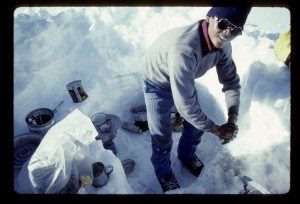I would like to discuss four bezels of the same diamond: tempo; the need to slow down to include inner voices; repeating pieces for greater comprehension; and slowness.
TEMPO
 Like rays of light from a stylized bronze sun, tempi all start the same and end up in wholly different countries. A tempo tells us as much about a piece as its notes. In varying tempi every few seconds, Bernstein, for instance, in West Side Story, gives us the scattered nature of modern society.
Like rays of light from a stylized bronze sun, tempi all start the same and end up in wholly different countries. A tempo tells us as much about a piece as its notes. In varying tempi every few seconds, Bernstein, for instance, in West Side Story, gives us the scattered nature of modern society.
Elliott Carter is even more notorious for complex rhythmic changes. If we move backwards from our own fragmented world of techno, where a disk jockey collaborates with the record itself to provide even more spontaneous rhythmic changes, we can see the presence of such hesitations in Mozart’s operas, in Schubert’s hesitant fatalistic dances, in Chopin’s rubato, in the pulled bittersweet three-quarter waltzes of the Strausses.
As Christa Ludwig, the mezzo-soprano, said of Bernstein:
. . . with every other performance he was different. And you know the same thing Karajan made also. He said: “If I make always the same tempo, you are in a routine after two or three performances.” And so they do it on purpose, to be different. Also it has something to do with their constitution, how they feel when they wake up in the morning! It is the question of how is the weather, how is the pulse; so they are never the same. It is always different from the last performance.
We spend our time trying to catch up to the future when all along, as Proust felt, what we are chasing is behind us. We need to slow down to see it or hear it, the way children, lacking adult worries, have the freedom to be excited by falling snow. We have inherited a tradition of speed started for good reason by Toscanini and later, Casals, to erase the sentimentalism of lugubrious salon music. Slow tempi can nonetheless be gimmicks, attempts at grandstanding.
But in fact changed tempi are ways of strangifying familiar pieces in order to hear them freshly. Slowness creates space in which the magic of a piece can function, it gives the mind time to make associations, it provides a meditative environment in which nuances of tone and touch stand out. Virtuosic displays leave us feeling cheated, our lowest instincts exploited, while moments of great silence and beauty are what we feel, what we remember.
When we play a piece for the first time, we take it slowly, astonishing ourselves as we hear absolute newness unfold under our uncertain fingers. We even play passages over
and over, wondering at their structure, their revelations, their unexpected turns, their quirks.
Later, once we’ve memorized the piece, we’re bored by the easily grasped tempo through which we learned it, and the only challenge becomes to play it faster, while retaining much of that initial information and dramatic unfolding. But, alas, we are habituated to it, and we fail. What seems apparent to a jaded performer, contemptuous with familiarity, is, however, uncharted territory to our listeners, who are baffled by hearing so much, so fast.
In this way music is lost forever, driven by performance clichés. Bach’s Partita in E major is played by everyone as a virtuoso piece, when in fact it is simple and lovely, so to play it fast is like teaching a turtle to run. In the self-conscious panic of that speed, all the detail that attracts musicians to it is lost. It is like Ralph Fiennes rushing through Hamlet to simulate energy with haste.
As Bernstein said of Glenn Gould:
I admired . . . his constant inquiry into a new angle or a new possibility of the truth of a score. That’s why he made so many experimental changes of tempi. He would play the same Mozart sonata-movement adagio one time and presto the next, when actually it’s supposed to be neither. He was not trying to attract attention, but looking for the truth. I loved that in him.
 Pianists, when they are alone, will play for themselves, to move themselves. Pianists in the presence of a tuner, a producer, an engineer will play to protect their reputation and the legend of their technique, and the music disappears, veiled in defenses. This is why Gould tried to empty the room of listeners. Only then can the audience hear what the musician hears, oxymoronically, when there is no audience.
Pianists, when they are alone, will play for themselves, to move themselves. Pianists in the presence of a tuner, a producer, an engineer will play to protect their reputation and the legend of their technique, and the music disappears, veiled in defenses. This is why Gould tried to empty the room of listeners. Only then can the audience hear what the musician hears, oxymoronically, when there is no audience.
INNER VOICES
The other advantage of accommodating tempi to the complexity of the music is that it allows time for inner voices to be heard and understood. In the rush to impress the topmost melody of a piece on an audience in a concert hall, inner voices must be sacrificed, as they are hard to hear in such large rooms. But what made Horowitz so wonderful as he aged was his insistence on those voices, which made his interpretations so fresh, so exciting. It wasn’t just the sudden power, the dynamics. It was the detail.
Glenn Gould was a constant advocate of the need to vary tempi, reverse emphases, make new accents, and generally surprise oneself, in order to revitalize music, to keep it new. Gould found he had to retire from the stage to follow his own inner voice, to exclude the inner voices of others, as concerts tempt us to reach the rafters. Such revolutionary playing is easier to understand on a disc at home, where it can played over and over, than in the last chance saloon of a concert hall. Gould always disparaged the “non-take-twoness” of the stage.
REPETITION
Much music from the classical era involves repeating long sections, which can be either boring or stimulating, depending on how the repeats are played. I once asked a well-known pianist why he played the repeats differently.
“Never bathe in dirty water” was his answer, one I found to be lacking insight. To me, a repeat is a chance to bring out elements in the music which couldn’t be included the first time around. It is an opportunity to deepen our perception of the music. Music contains more than it can present. Not only must the pianist be given several chances to reveal intricacies which often happen too rapidly to appreciate, but listeners must be allowed to familiarize themselves gradually with the themes and their variations.
One piece in its timing serves many masters: changing melodies flow from similar notes as marble cities are issued from the same dark quarry. A film depends as much on its audience as on its director, even though the projection remains the same. Some films improve with viewing, because our perceptions change with familiarity. Experience is the constant shimmy of chaos over order, like changing light in a meadow.
As we each take something different away from anything that happens, we should be able to loop a melody in live performance time in the same way that we set a stereo to repeat our favorite song endlessly.
Sir Walter Raleigh, when he was imprisoned in the Tower of London, saw a fight break out in the courtyard below his aerie. When he asked about it at lunch, every witness told him a story different from what he had himself seen. (This phenomenon can be repeated if you’ve ever seen an event in real life which is later distorted by television reportage.)
 Raleigh went upstairs and burnt The History of the World, Part II. To this day, we only have Part I. Mere observation is no guarantee of truth. As Wittgenstein said to his students, although we know the earth goes around the sun, what would it have looked like if the opposite were true? It would have looked the same.
Raleigh went upstairs and burnt The History of the World, Part II. To this day, we only have Part I. Mere observation is no guarantee of truth. As Wittgenstein said to his students, although we know the earth goes around the sun, what would it have looked like if the opposite were true? It would have looked the same.
When musicians perform, the music changes with the angle, the seat, the hall, the prior steak, or the cognac to come. When you build a Steinway, nothing is certain: each piano turns out entirely different. The same process produces beauty as it does beauticians. As in the making of Burgundy, regularity is sacrificed to the possibility of sporadic bliss. To set a piece in stone is to lose the mobility of it, to abandon the suddenness and strangification that comes from sublime ignorance. Composers in the classical era put repeat marks around their music, as Dickens says, to do the police in different voices, to give the patient a second opinion. The only way to do that today, in an era without second chances, is to play the piece twice. I used to listen to the disk jockey Watson each night on WNCN. One morning at around 2 a.m. a woman called up to complain that the Bach B Minor Mass was too long. “Well, madame, obviously you weren’t listening,” he said, and played the entire piece again.
However, too much repetition dulls the mind. The rote of practicing often results in rote playing, or reductive role playing. It loses the spontaneity of discovering the piece for the first time. There should be a thousand first times. Roland Barthès feels that only practicing retains the surprise of initial discovery. Performance never achieves that element of virginity.
My friend Peter Van Etten, after hearing a master class at the Aspen Music Festival, said it was vastly superior to performance, and maybe pieces were heard best when explained phrase by phrase rather than performed in a rush.
The same is true for memorizing. Rather than allowing the sudden lurch of a note into prominence, the quick slip of a rhythm into a demilitarized zone, a zombieland of anarchy where no time rules and no note leads, memory feels the need to solve its problems, to fit the complexities of time and space into neat cubbyholes of prearranged parries, of solved puzzles, so that what emerges from the petrified stage-fraught mind is a child’s dinner of connected dots, an alphabet soup where most of the elusive, bobbing letters are hidden under a consistent, bland tomato broth.
The great Austrian novelist Thomas Bernhard hated memorizing, as well as the concept of virtuosity. Both defeat the ability of music to breathe, to be human, rather than superhuman. He speaks out against such braggadocio in three of his novels: The Loser, Old Master, and Wittgenstein’s Nephew.
Richard Wilbur says the same about naming things. Once a bear becomes an easily-named noun called a “bear,” the wonderful uncategorizable monstrousness of the apparition has been categorized, fit into its round hole and defanged.
Memorizing a piece, or over-practicing it, names it.
SLOWNESS
“Lente lente currite noctis equi,” said Faust. What he meant was: I gave my soul in order to sin without any consequence but one: my soul goes to hell at midnight. And so, slow down, nightmares; hold your horses. In the Himalayas, where dreams are as sluggish as yaks, where sleep is reluctant and waking always incomplete, where time flows no faster than rocks fall or streams freeze, music merges with the revolution of the earth to ignore the arbitrary past of cities. The sky whirls in retrograde motion, and our sins and failures seem distant, seen through the wrong end of the telescope.
As Lukas Foss said to W. W. Burton about Bernstein’s tempi at the end of his life:
[It] came from Lenny’s desire to really pump the most out of the music, to milk it, to get everything out of it that was in it. Sometimes he would do that by driving home the point, by being totally emphatic about every detail. I think that is how the tempi became slower. . . . If you want to make sure that people hear the detail in a piece then you slow things down.
Or as John Mauceri said of acoustic reasons for Bernstein’s tempi:
I think there is something here with Lenny that is rarely discussed and that is that Lenny in a recording studio and Lenny in a concert hall were two very different people. Very different in the sense of how to use the room and also the medium. Lenny in the studio tended to be slower, because, like all of us, he wanted to hear everything. It also depended, obviously, on the acoustics of the room and the microphone placement; if the room was dry he tended to conduct faster; if the room was reverberant he tended to conduct slower.
 Brendel notes that the Hammerklavier Sonata was marked too fast by Beethoven. All meaning, detail, emotion is lost by that tempo. Yet times dictate such mechanical speeds as proof of passage: they want to get there, but not be anywhere while they’re going.
Brendel notes that the Hammerklavier Sonata was marked too fast by Beethoven. All meaning, detail, emotion is lost by that tempo. Yet times dictate such mechanical speeds as proof of passage: they want to get there, but not be anywhere while they’re going.
It happens to each of us at some time. We are sitting quietly in a playroom, ordinary children, perhaps watching Million Dollar Movie or The Lone Ranger, with their soundbite echoes of faded afternoon glories (Rhett Butler, William Tell), which have become, before there is elevator music, the cheapened rhythms of a daily suburban routine, the beats that sustain the emotional anguish sprung from the cookie-cutter households and family sitcoms which were the opiate of the time, the Truman Show projections which curtained off the engines of the Krell, The Matrix which kept our dreams in check, and suddenly, into that snowglobe of contained frenzy, intrudes a slow murmur, the shaded grove, the open window of Dvorak.
The blood freezes, the pulse pauses, and suddenly these perky, theme-park, fountain-foaming fireworks of the Muzak maelstrom fall aside in front of the movement of the modern mind, the child unleashed from stodgy Victorian roles into the benign evening with its slow, brilliant, blood-tinged clouds.
If velocity were the fluttering pennant of authenticity, then the fastest performances would be the best. When Rubinstein asked Lhévinne why he played a piece so fast, Lhévinne replied simply, “Because I can.”
A pianist I knew heard a friend play the Schumann Toccata faster than anyone he had ever heard.
“Why did you play it so fast?” my friend asked.
“Oh,” said his friend, “I can play it faster than that.”
We find ourselves eavesdropping enviously on previous decades, wondering what distinguishes them from ourdigitally perfect discs, and the answer is, often enough, that our forebears took time with the music. Just because we are digital doesn’t mean we are alarm clocks.
Every age suffers from what Liszt called:
a fruitless virtuosity, . . . a soulless, senseless delivery of masterworks, which for sheer thumping and thrashing cannot be comprehended.
It is more difficult to learn a new language when a native speaker races through it, and music is a new language for much of its audience, even for musicians. We learn the notes slowly, with a sense of awe and discovery, and then as soon as we can, we throw away the great spaces that moved us, to flaunt our airtight polish.
Rapidity has never been a trait associated with romance: we court in slow motion. Girls distrust the whirlwind romance, rightly. A performer is charged with recomposing the music, and the revelations of creation are not subways, but pastures. Cows ruminate effectively; roadrunners do not. Sarabandes, not polkas, give us pause. As my teacher once said, music is fastidious contemplation. (Although no sooner spoken, this particular improvised illumination fled his repertoire. Music and language did better, he believed, without the spotlight of immortality. Pianists played better when they weren’t recorded. The pressure of a sudden inspiration’s having to remain fresh forever contradicted the entire point of repartee, of a quick thrust of the sword before flight. Occasional wit isn’t meant to be repeated. As the poet Archibald MacLeish wrote, “They also live who swerve and vanish in the river.”)
 I feel a Quixote-like obligation to free meter from the metronome, to cut space loose from its Einsteinian slavery to time, which after all is a man-made division of a rather more flowing universe. Deadlines are a recent metaphor, a new opiate, a clever oppression. Music needs time to think. The fast lane has overridden time, and with it all the artifacts of leisure, such as family, or Frisbee golf. Our musicians are businessmen, striding briskly down the corridors of Chopin.
I feel a Quixote-like obligation to free meter from the metronome, to cut space loose from its Einsteinian slavery to time, which after all is a man-made division of a rather more flowing universe. Deadlines are a recent metaphor, a new opiate, a clever oppression. Music needs time to think. The fast lane has overridden time, and with it all the artifacts of leisure, such as family, or Frisbee golf. Our musicians are businessmen, striding briskly down the corridors of Chopin.
The world can never go home again, probably, but that is what certain meditative artists, such as Proust and Nabokov, attempt: to revisit lost worlds, and I think it might be a good time to locate, in the coves of our frenzied cortex, those musical madeleines, fragrant with our former innocence.
The idea is not to drag race a piece, but to convey it without becoming occupied in the day-to-day struggle of the notes. To become a statesman, not a showman or a politician. I’m reminded of the woman who approached the great pianist Paderewski.
“Are you the great Paderewski?”
“I am, madame.”
“And aren’t you Prime Minister of Poland?”
“Indeed I am.”
“And weren’t you a pianist?”
“Yes, madame” (getting impatient).
“. . . What a comedown!”
Someone else said to a film star, “Didn’t you used to be James Garner?” I’m sure I have the wrong star, but the right quadrant.
To lose oneself in the battle of the notes is to become a commando, a Rambo. Mere speed is suitable only for the well-barricaded race track of the low road, pandering to our Circus Maximus instincts.
We are all susceptible to the sheer electricity of a Horowitz or a Volodos. Both musicians know, to their credit, how to amaze the public in order to prepare them for a moment or two of quiet truth, the author’s message. Perhaps we must earn the right, with noise, to be peaceful. But if I only had one chord to play, it wouldn’t be the first chord of the Tchaikovsky First Piano Concerto.
